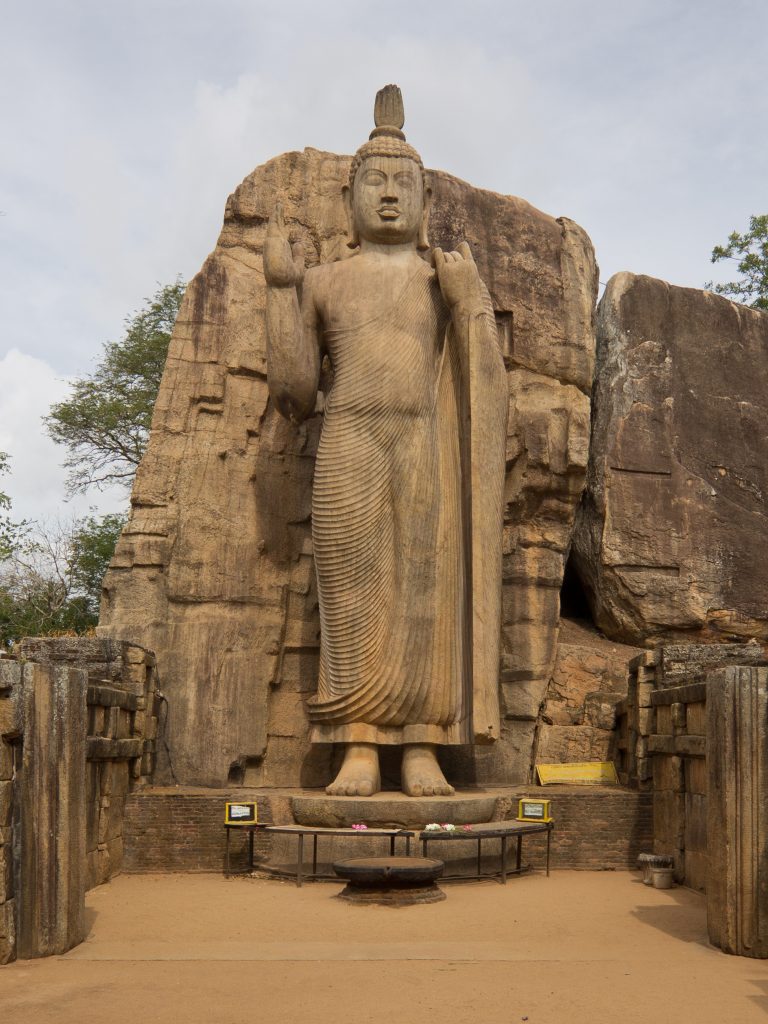Buddhism is one of the world’s major religions and spiritual practices. Buddhism would not exist if it were not for the heightened consciousness of a man named Siddhartha Guatama (563 BCE-483 BCE).1 According to Buddhist legends about Buddha, after many reincarnations, Siddhartha was born into a rich Indian Family, of the Warrior caste, in which he experienced a privileged and wealthy life into his twenties. But Siddhartha abandoned that life for one without material possessions, but filled with spiritual wisdom and insight, all in pursuit of Nirvana, or, Enlightenment.2
According to Buddhist traditions, during the sixth century BCE, a woman had a dream of an elephant entering her body after being offered a lotus flower by the elephant. She was the queen of a small Indian kingdom. She asked the Wise Men what the vision meant. They explained to her that she would have a son who would either be a great conqueror, or a great holy man. Months later Siddhartha Guatama was born and in the subsequent week, the Queen died.3
Siddhartha grew up sheltered by his father. The King wanted him to become the great conqueror and ruler that the Sages had prophesied he could become. Siddhartha lived in luxury at the palace of his family. “I had three palaces: one for the cold season, one for the hot season, one for the rainy season. During the four months of the rainy season I was entertained in the rainy-season palace by minstrels without a single man among them, and I did not once come down from the palace.”4
According to those same traditions, one day Siddhartha told his charioteer to take him out to see the outside world. Siddhartha would take four trips outside before his

renunciation of extravagance and sensual pleasure. On the first trip he saw an old man. After this experience, Siddhartha’s father explained to the charioteer that Siddhartha must not become a holy man as the sages had said he would become. So he continued his attempts to keep Siddhartha in the palace, by fueling the sensual pleasures of his son. The second trip out, Siddhartha witnessed a sick man. On the third trip, Siddhartha came across a corpse, realizing that death is imminent in all of our lives, no matter how abundant or extravagant we live. During Siddhartha’s fourth and final trip out as an Indian prince, he came across a holy man, bald and wearing a yellow robe. Siddhartha asked for an explanation from his chariot driver, to which the charioteer explained the man to be a renunciant. All these experiences outside the palace caused Siddhartha to realize that pain and suffering is inherent to life. He wanted a way out of this cycle of suffering; he realized that all sensual pleasures were vain and short-lived.5 “Even though I was endowed with such fortune, such total refinement, the thought occurred to me: ‘When an untaught, run-of-the-mill person, himself subject to aging, not beyond aging, sees another who is aged, he is horrified, humiliated, & disgusted, oblivious to himself that he too is subject to aging, not beyond aging.”6
Finally, one night at the age of 29, Siddhartha made the hard decision to leave his wife and newborn son, and live as a holy man. He was tempted by Mara, the demon of desire, as he left the palace. Mara presented to him the idea that if he would turn back, he would be a great ruler in the world. Siddhartha rejected Mara’s proposal. He left everything behind, and began his journey towards Enlightenment, towards Nirvana.7
- Jens-Uwe Hartmann, The Dating of the Historical Buddha: Part I (Vandenhoeck & Ruprecht in GÖTTINGEN, 1991) 32; Maha-parinibbana Sutta, Last Days of the Buddha, translated from the Pali by Sister Vajira & Francis Story (Access to Insight (Legacy Edition), 30 November 2013) DN 16. The former source presents the date of death of the Buddha in 483 BCE, while the former explains the death of Buddha at an age of 80, creating a timeframe for his life and death. ↵
- “The Buddha,” PBS Documentary, directed by David Grubin (PBS, 2010), DVD. ↵
- “The Buddha,” PBS Documentary, directed by David Grubin (PBS, 2010), DVD. ↵
- Sukhamala Sutta, Refinement, translated from the Pali by Thanissaro Bhikkhu. (Access to Insight (Legacy Edition), 1 December 2013) AN 3.38; Chris Pauling, Introducing Buddhism (Birmingham: Windhorse Publication, 1990), 5-6. ↵
- E.H. Brewster, The Life of Gotama the Buddha (London: K.Paul, Trench Tubner & Co., 1926), 1-3. ↵
- Sukhamala Sutta, Refinement, translated from the Pali by Thanissaro Bhikkhu. (Access to Insight (Legacy Edition), 1 December 2013) AN 3.38 ↵
- “The Buddha,” PBS Documentary, directed by David Grubin (PBS, 2010), DVD. ↵



40 comments
Engelbert Madrid
Historical stories, such as the one about Siddharta Gautama and his journey to seek holiness, is quite interesting. Although I don’t have enough knowledge about Buddhism and its history, I can connect certain points with Christianity, since both religious seek to have a spiritual life. However, Gautama seeks to find holiness, while Jesus finds a way to save his people from sin.
Diego Terrazas
I always find his story quite fascinating. Him being sheltered from the world and not seeing the bad things in the world, and then one day encountering them first hand, is quite astonishing. I have always respected the Buddhist religion and its origins/foundations. One particular thing I revere about the Buddhist religion is how they are able to suppress their desires to such extremes
Danielle Slaughter
As a Christian, even I have recognized the merit that is to be found in Buddhism. The story of Siddharta Gautama’s temptation by Mara reminds me off Jesus being tempted by Satan in the wilderness, how they both were promised the whole world if only they would give in. Buddhism truly is a beautiful religion, and I feel that although you don’t have to convert, certain principles would do well to be adopted into everyone’s life.
Madison Guerra
This article was very interesting and i had no idea where the ideas of Buddhism came from. It was interesting to learn about the background of this religion and some of the foundations of it. The story was very thorough about Siddhartha Gautama and inspiring. The fact that that Siddhartha went on these journeys and discovered different aspects of life is truly amazing. It makes me want to show more appreciate the Buddhism religion more than i previously did.
Sebastian Carnero
Buddhism shows some simple but very powerful ideas. The main plot of the story was fired up by a prediction. I found how they thought people reacted and saw aging very accurate and interesting. Additionally, this prediction “theme” resembles the one in the story of Perseus, whose grandfather is said to be killed by him. They both show that because of the one who heard the story’s efforts to manipulate the outcome, the result they didn’t want is the one that happens.
Steven Hale
I can certainly see the appeal Buddhism offers after reading this article. Especially when compared with the Brahmin who all lived lives of incredible privilege at the top of the caste system, Siddhartha Guatama was a truly authentic leader. Imagine the devotion it would take to abandon your family and wealth in pursuit of an ideal. I certainly couldn’t do it. It seems also from his trips outside that he was incredibly empathetic. His reflections on the sick and aging were profound.
Honoka Sasahara
However I was born in Japan, a country where Buddhism is popular religion, I did not have so much knowledge of it and its origin.
This article gave me some helpful information and it made me more interested.
I thought that Siddhartha Gautama was a intelligent and strong man who can follow his desire even if it costs him some suffer.
Anna Guaderrama
I must say, I love how this article was written and great choice on choosing Siddhartha Gautama tow rite about. I have always admired his story and I strongly feel like there is something from his life that we can all take and learn from as well making the conscious attempt to instill some of the values he taught in our everyday lives. It’s refreshing to hear about a selfless person not driven by greed and materialistic things.
Cristina Cabello
This is a really good story about Siddhartha Gautama. I always find these historical religious stories interesting. Sometimes it is hard to find who you are in life. But I am glad that he took his time and wealth to do that. They both took the risk of a long journey to gain an amazing opportunity. I think it is crazy how many different religions there are.
Vanessa Tombo
I have always found the story of Siddhartha Gautama, very inspirational. A man of great wealth and upbringing relinquishing his title and place in society in order to find himself. His story often draws a few similarity to the Parable of the Prodigal Son. Both left the comforts of their homes ( though for different reasons) in search of something. Both gained life experiences and knowledge that changed their definitions of self.